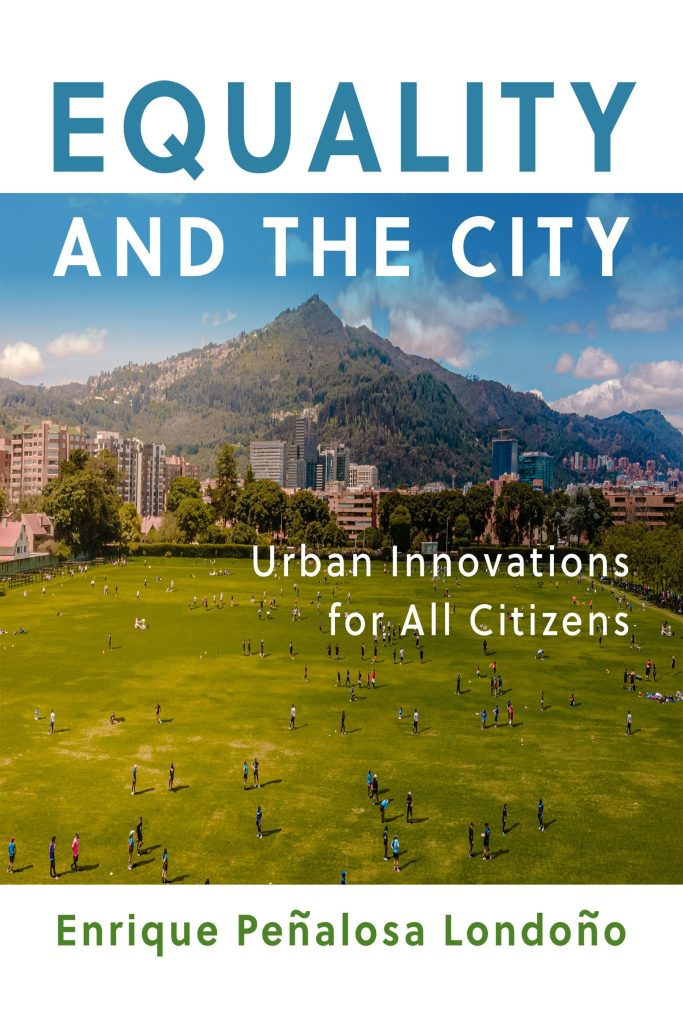How Cities Can Put Equality First Through Sustainable Transportation

Enrique Peñalosa Londoño has an international reputation for using the humble bus, bikeway, sidewalk and park to make cities more equitable, starting with his game-changing two terms as the mayor of Bogotá, Colombia. And in his new book, Equality and the City: Urban Innovations for All Citizens, he unpacks how those tools can transform communities into advanced cities where the transportation is an equalizer rather than a divider.
Tune into this guest episode from Scott Shepard of the #CitiesFirst podcast, and check out a transcribed excerpt from their conversation below.
The following has been edited for clarity and length.
Scott Shepard: Tell us about your book, your inspiration, and what led you to write this kind of tour de force.
Peñalosa Londoño: First of all, my book is about equality. And I say that a good city comes from equality.
I mean, the whole world has adopted private property and the market as the best way to manage most of society’s resources, not because it’s good for the rich, but because it’s the best way for everybody. I mean, the private way of managing society’s resources is more efficient, produces more benefits for everybody. But it has a problem: it creates immense inequality. And we don’t like inequality. Hundreds of millions of people have died over the last couple of 100 years fighting for equality in wars of independence and revolutions.
So I am not going to to solve the equality issue. Of course there are people who are working on how to have higher taxes for the wealthy [and things like that] —this is a different discussion. All I’m saying is that a good city can create an environment where nobody should feel inferior or excluded. A good city constructs equality.
And what kind of equality [do cities construct?] One equality that good cities construct is that rich and poor meet as equals in many places — [especially] in public spaces.
I mean, [think about] the rich and the poor; the owner of the $20 million apartment meets the doorman. But they meet separated by hierarchies. The interesting thing [is], if they meet in the sidewalk, or in the park, or in public transport. is that they meet as equals. It’s a completely different relationship.
In some sense, this is why some societies are more legitimate than others. They work better. Like Sweden, for example; in Sweden, there are billionaires, [like] the people who own IKEA ,or the people who own a Spotify, or whatever. But the interesting is that in Sweden, these billionaires, they go to public transport, they use the bicycle, they go to the bakery, they walk to the bakery, to the cafe next door. And so this is this creates a different environment.
So the first thing a city can do is that they can get many wealthy and poor [people] meeting as equals. And second, like you find in Central Park — in Central Park you can have billionaires walking every weekend, and also people who are very poor next to them.
Now a different another kind of equality cities build is the quality of life. I mean, you cannot give individual goods to everybody; you cannot give everybody a trips to Paris, or fancy cars or whatever. But you can [allow] everybody to have access to music lessons, or to gyms, or to sports facilities, or to greenery. You should be able to have access to greenery not because you are a member of a country club, or you have a country house, but because, as a citizen, you have access to great parks and things like this.
And another the last principle I mentioned and develop [in the book] is what I call democratic equality. Democracy is not just the fact that people vote; that’s one ingredient of democracy. Democracy is that our constitution is obeyed. And all constitutions are based on the principle that citizens are equal before the law. If this is so, public good prevails over private interest. This is not just poetry; this is extremely powerful …
My book is about things like this, and many more. [It’s about] how bicycling is important for equality, and how [it can] ensure that equality. A good city constructs equality, and a more equal society tends to build better cities.
source https://usa.streetsblog.org/2024/07/02/how-cities-can-put-equality-first-through-sustainable-transportation

Comments
Post a Comment